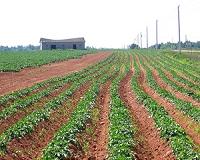 |
Bordeaux, France (AFP) Jan 30, 2011 Two historical Bordeaux wine estates have gone green, breaking a long resistance to organic viticulture amongst the region's elite producers. As in other world-class regions, an organic approach is a weapon in their battle for sustainability. "Still in 2011, there are people who do not trust in the fact that it is possible to grow organic in Bordeaux," said Jean Michel Comme, manager of the 80-hectare (200-acre) Chateau Pontet Canet in Pauillac. "As soon as the total estate was organic and biodynamic, we aimed for a certification as a way to prove that we were sincere in our project." "This is a return to viticulture in the right direction," added Xavier Planty, co-owner and director of the first-growth 100-hectare Chateau Guiraud estate, recently certified organic. Wine made from organically grown grapes is generally defined as made without using any synthetic fertilizers, weed killers or insecticides. "But organic viticulture is just one step, and it only has meaning if you work the rest of sustainability," said Planty. Naysayers have long argued that while Bordeaux's location on the 45th parallel in southwest France creates ideal conditions for Cabernet and Merlot, it's also a happy spot for rot, mildew and voracious insects like grapevine moth that can destroy quality, yields and ultimately profits. "We have to put an end to this idea that everyone is beautiful and nature is beautiful," said Muriel Barthe, technical director at Bordeaux's wine council. "We have to fight against aggressors. It's a constant battle." Organic grape growers use copper -- a traditional method -- for fighting mildew, but Barthe nixes that as an option for Bordeaux. "Copper is a heavy metal and we know it's toxic for the soil," she said. "We are not going to go backwards." As of 2010, 343 wine estates in the Gironde, where Bordeaux appellations dominate, practice organic viticulture. Some 2,250 hectares are in conversion and 1,836 hectares are already certified. More could be on the horizon. -- Last holdout may be consumers -- ----------------------------------- Last year, Bordeaux's wine council began a pilot sustainability program with 25 winegrowers, cooperatives and negociants with the objective of achieving ISO 14001 certification. One year later, they have 250 new candidates. "It'll go fast," predicted Barthe. Frontrunners such as Planty and Comme show evidence that low yields and a holistic approach allows them to avoid using low levels of copper, and eliminate the pesticides that could endanger workers' health. "It's true that organic viticulture requires one to accept that the vines re-find a balance with regards to the soil," Planty said. "People think they are going to go organic but keep the same industrial production philosophy. That doesn't work. You have to change the approach," added Comme. "The industrial system is not sustainable. It's not economical. It survives with subsidies." Both Planty and Comme contend that the lower yields are offset by increased grape quality, which leads to a higher proportion of first-label wines and profitability. "Pontet Canet is not a potato patch," said Comme. "I need sufficient yield and quality." Furthermore, Comme argues the same model works for less prestigious estates. "I don't live in the bubble of grand cru classe estate -- I have a little vineyard myself," said Comme. Comme's wife Corinne runs their modest 10-hectare organic estate Chateau du Champs des Treilles, and sells their wine for a respectable seven euros (10 dollars) a bottle. She now consults with first growth Chateau Climens in their conversion to organic and biodynamic grape growing, while Monsieur Comme consults with cru bourgeois Chateau Senejac with 40 hectares in conversion. "There is a real dynamic of development in conversions to organic viticulture," said Elisabeth Mercier, director of Agence Bio, which certifies the vineyards. The last holdout against organic grape growing -- and the most influential -- might not be the winegrower but the consumer. A recent study from a California environmental economist showed that while quality might improve using organically grown grapes, the retail price dropped once the labeling mentioned organic. Winegrowers say it is time for consumers to rethink their attitude. "It seems to be clear that the wines of the estate have gained in aromatic complexity, finesse and nobility in the quality of tannins," said Comme.
Share This Article With Planet Earth
Related Links Farming Today - Suppliers and Technology
 Toward Controlling Fungus That Caused Irish Potato Famine
Toward Controlling Fungus That Caused Irish Potato FamineWashington DC (SPX) Jan 21, 2011 Scientists are reporting a key advance toward development of a way to combat the terrible plant diseases that caused the Irish potato famine and still inflict billions of dollars of damage to crops each year around the world. Their study appears in ACS' bi-weekly journal Organic Letters. Teck-Peng Loh and colleagues point out that the Phytophthora fungi cause extensive damage to food ... read more |
|
| The content herein, unless otherwise known to be public domain, are Copyright 1995-2010 - SpaceDaily. AFP and UPI Wire Stories are copyright Agence France-Presse and United Press International. ESA Portal Reports are copyright European Space Agency. All NASA sourced material is public domain. Additional copyrights may apply in whole or part to other bona fide parties. Advertising does not imply endorsement,agreement or approval of any opinions, statements or information provided by SpaceDaily on any Web page published or hosted by SpaceDaily. Privacy Statement |